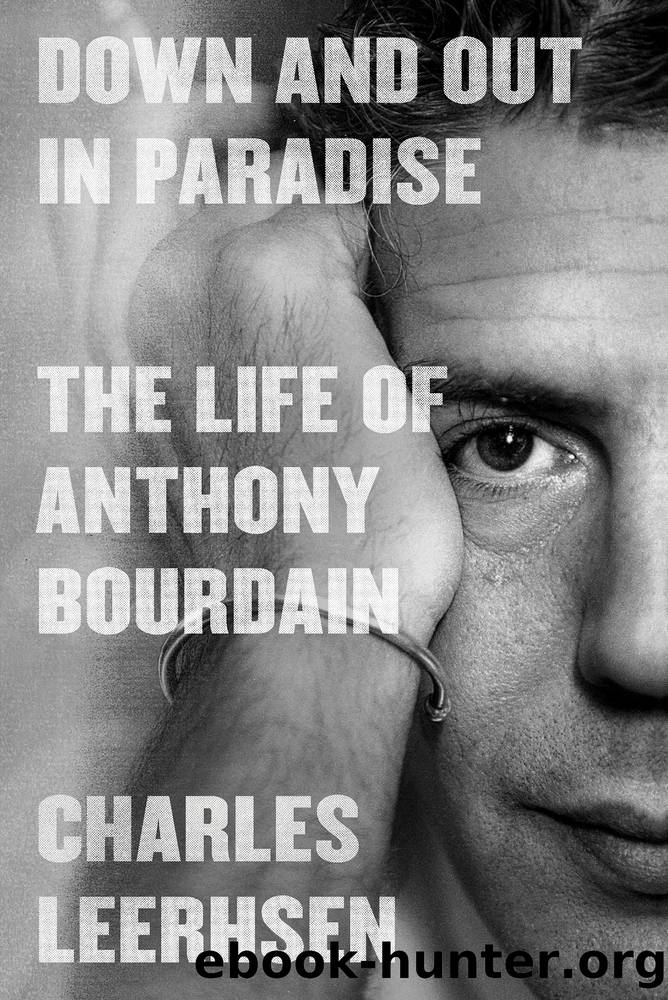Down and Out in Paradise by Charles Leerhsen

Author:Charles Leerhsen
Language: eng
Format: epub
Publisher: Simon & Schuster
Published: 2022-10-11T00:00:00+00:00
No, thatâs not terribly good, either. A poet I showed it to for her evaluation called it âa poem trying too hard to be a poem.â But Rose had taken an immediate liking to Tony the man and felt moved to help him get better. Together they reworked a semi-fictional sketch of Tonyâsâabout a twenty-something chef who gets turned away by drug dealers because they canât make out the track marks on his arm and therefore think he may be an undercover copâinto something publishable. âFAO,â as the story came to be called for obscure but no doubt valid artistic reasons when it appeared in Between C & D, marked Tonyâs first foray into print. He wasnât kidding himself, though. He knew he had a lot to learn about the craft of fiction, and because he always read a lot about writerâs livesâhow, when, and where they worked; their relationships with their editors; their favorite cocktails; and so onâhe thought he knew just the literary guru he might learn it from, the guy everyone said was the best. In a letter to Rose, he said he looked forward to âlife after Lish,â when doors both real and metaphorical would swing open before him.
Poor Tony. Gordon Lish was, like Andy Menschel, a force to reckon with from Hewlett, Long Island. At Esquire magazine and later the publishing house Alfred A. Knopf, heâd forged a reputation as a sometimes brilliant but often overly aggressive editor who injected too much of himself into the work of Raymond Carver, Richard Ford, Cynthia Ozick, Barry Hannah, Amy Hempel, and Don DeLillo. Or tried to. Some authors pushed back against his brash blue-penciling, while others, because they were more easily cowed or sincerely believed he had improved their writing, let his changes stand. It would later emerge that Lish had taken the liberty of transforming Carver into the pioneering minimalist that many came to admire by making massive cuts and changing his endings and titles (âWhat We Talk About When We Talk About Loveâ had originally been called âBeginnersâ). Even Carver had to admit that his stories were often better for being made leaner and somehow more mysteriousâand they certainly were better read than previously. But Lish ultimately alienated too many influential authors and agents, and after he was eased out at Knopf, he picked up the thread of a teaching career at Yale and, later, Columbia, conducting seminars in fiction writing at the homes of trembling students.
The heartbreaking thing was that not all of his acolytes trembled with fearâat least at the start of each seminar. Some trembled with excitement and anticipation as they settled in with eager faces and sharpened pencils among the classmates who, it soon became clear, were there mostly to have their emotional resilience pushed to its limits. Captain Fiction (as Lish called himself) liked to demonstrate early and often that the put-downs heâd scribbled on manuscripts at Esquire and Knopf paled in comparison to what he was happy to tell a fledgling writer to her face, with a full complement of peers watching.
Download
This site does not store any files on its server. We only index and link to content provided by other sites. Please contact the content providers to delete copyright contents if any and email us, we'll remove relevant links or contents immediately.
Kathy Andrews Collection by Kathy Andrews(11831)
The remains of the day by Kazuo Ishiguro(8999)
Spare by Prince Harry The Duke of Sussex(5197)
Paper Towns by Green John(5191)
The Body: A Guide for Occupants by Bill Bryson(5096)
Industrial Automation from Scratch: A hands-on guide to using sensors, actuators, PLCs, HMIs, and SCADA to automate industrial processes by Olushola Akande(5061)
Machine Learning at Scale with H2O by Gregory Keys | David Whiting(4313)
Be in a Treehouse by Pete Nelson(4051)
Never by Ken Follett(3956)
Harry Potter and the Goblet Of Fire by J.K. Rowling(3857)
Goodbye Paradise(3810)
The Remains of the Day by Kazuo Ishiguro(3413)
Into Thin Air by Jon Krakauer(3399)
Fairy Tale by Stephen King(3396)
The Cellar by Natasha Preston(3344)
The Genius of Japanese Carpentry by Azby Brown(3309)
120 Days of Sodom by Marquis de Sade(3275)
Reminders of Him: A Novel by Colleen Hoover(3116)
Drawing Shortcuts: Developing Quick Drawing Skills Using Today's Technology by Leggitt Jim(3080)
